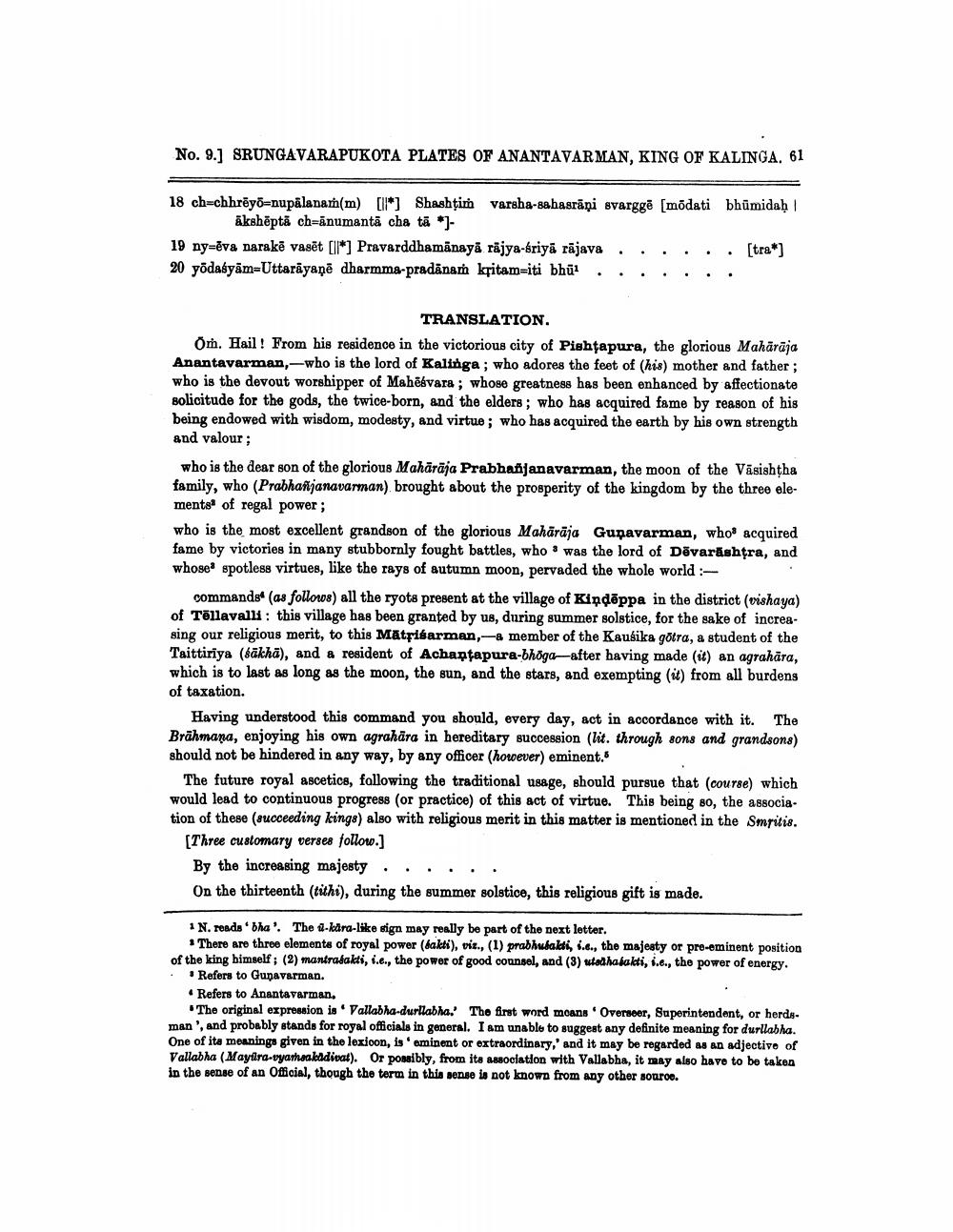________________
No. 9.] SRUNGAVARAPUKOTA PLATES OF ANANTAVARMAN, KING OF KALINGA. 61
18 ch=chhr@yo=nupālanam(m) [11*] Shashtim varsha-sahasrāņi svarggē (modati bhūmidaḥ
äkshēptă ch=anumantä сha tā ]19 ny=ēva narakē vasēt (1) Pravarddhamanaya räjya-briyā rājava . . . . . (tra*) 20 yödabyām=Uttarāyaņē dharmma-pradānam kfitam=iti bhū .......
TRANSLATION Om. Hail! From his residence in the victorious city of Pishtapura, the glorious Mahārāja Anantavarman,-who is the lord of Kalinga ; who adores the feet of (his) mother and father ; who is the devout worshipper of Mahēsvara ; whose greatness has been enhanced by affectionate solicitude for the gods, the twice-born, and the elders, who has acquired fame by reason of his being endowed with wisdom, modesty, and virtue; who has acquired the earth by his own strength and valour;
who is the dear son of the glorious Mahārāja Prabhañjanavarman, the moon of the Vāsishtha family, who (Prabhañjanavarman) brought about the prosperity of the kingdom by the three elements of regal power; who is the most excellent grandson of the glorious Mahārāja Gunavarman, who acquired fame by victories in many stubbornly fought battles, who was the lord of Dēvarashtra, and whose spotless virtues, like the rays of autumn moon, pervaded the whole world :
commande* (as follows all the ryota present at the village of Kindöppa in the district (vishaya) of Tēllavalli: this village has been granted by us, during summer solstice, for the sake of increasing our religious merit, to this Matfisarman,-a member of the Kaubika götra, a student of the Taittiriya (bakha), and a resident of Achantapura-bhoga-after having made (it) an agrahāra, which is to last as long as the moon, the sun, and the stars, and exempting (it) from all burdens of taxation.
Having understood this command you should, every day, act in accordance with it. The Brāhmana, enjoying his own agrahāra in hereditary succession (lit. through sons and grandsons) should not be hindered in any way, by any officer (however) eminent.
The future royal ascetics, following the traditional usage, should pursue that (course) which would lead to continuous progress (or practice) of this act of virtue. This being so, the association of these (succeeding kings) also with religious merit in this matter is mentioned in the Smritis. [Three customary verses follow.] By the increasing majesty . . . . . . On the thirteenth (tithi), during the summer solstice, this religious gift is made.
* N. roads. bha'. The 7-kara-like sign may really be part of the next letter.
1 There are three elements of royal power (bakti), viz., (1) prabhubalti, 1.c., the majesty or pre-eminent position of the king himself; (2) mantrafakti, i.e., the power of good counsel, and (3) utadhalakti, 6.c., the power of energy. • Refers to Gunaverman.
• Refers to Anantavarman,
The original expression is. Vallabha-durllabha. The first word moans Overseer, Superintendent, or herdeman', and probably stands for royal officials in general. I am unable to suggest any definite meaning for durllabha. One of its meanings given in the lexioon, isominent or extraordinary,' and it may be regarded as an adjective of Vallabha (Mayura-vyamaakadivat). Or possibly, from its association with Vallabha, it may also have to be taken in the sense of an Official, though the term in this sense is not known from any other source.




